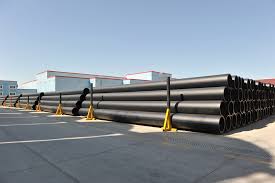Dec . 05, 2024 05:10 Back to list
hdpe sprinkler pipe factories
HDPE Sprinkler Pipe Factories A Deep Dive into Production and Applications
High-Density Polyethylene (HDPE) has emerged as one of the most beneficial materials for irrigation systems, particularly in the form of sprinkler pipes. HDPE sprinkler pipes are widely recognized for their durability, flexibility, and resistance to various environmental factors. This article will explore HDPE sprinkler pipe factories, their production processes, key benefits, and applications in agriculture.
Introduction to HDPE
HDPE, or High-Density Polyethylene, is a thermoplastic polymer made from petroleum. Its unique molecular structure provides exceptional tensile strength and chemical resistance, making it suitable for a wide range of applications, especially in the agricultural sector. The advantages of using HDPE for sprinkler pipes include its low weight, high impact resistance, and ability to withstand extreme temperatures, all contributing to its rising popularity.
Manufacturing Process of HDPE Sprinkler Pipes
The production of HDPE sprinkler pipes takes place in specialized factories equipped with advanced technology. The manufacturing process includes several key stages
1. Material Sourcing The primary raw material, HDPE resin, is sourced from reputable suppliers. The quality of the resin is crucial as it determines the final product's durability and performance.
2. Extrusion In this stage, the HDPE resin is fed into an extruder where it is heated and melted. This molten plastic is then shaped through a die into the desired pipe form. The extrusion process enables continuous production and ensures uniformity in the pipe's dimensions.
3. Cooling After extrusion, the pipes pass through a cooling bath or are cooled by air. This step solidifies the material and prepares it for further processing.
4. Cutting and Finishing Once cooled, the pipes are cut into specified lengths. At this stage, additional finishing operations may occur, such as beading or the addition of socket fittings, to facilitate seamless connections during installation.
5. Quality Control Quality assurance is critical in ensuring that the pipes meet industry standards. Factories perform rigorous testing, including pressure tests, to confirm the pipes' strength and leak-proof characteristics.
6. Packaging and Distribution Finally, the finished products are packaged for shipping. Factories often rely on automated systems to streamline this process, ensuring that the pipes are well-protected during transit.
Advantages of HDPE Sprinkler Pipes
HDPE sprinkler pipes offer numerous advantages over traditional materials such as metal or PVC. Some of the key benefits include
hdpe sprinkler pipe factories

- Durability HDPE pipes are resistant to corrosion, chemicals, and environmental stresses, ensuring a long service life
.- Flexibility The inherent flexibility of HDPE allows for easy installation and adaptability to various terrain conditions.
- Cost-Effectiveness While the initial investment may be higher compared to other materials, the long-term savings in maintenance and replacement make HDPE a cost-effective choice.
- Reduced Water Loss The smooth interior surface of HDPE pipes minimizes friction losses, leading to more efficient water delivery and reduced evaporation.
- Recyclability HDPE is recyclable, contributing to environmental sustainability. Many factories reuse waste material generated during the production process.
Applications of HDPE Sprinkler Pipes
HDPE sprinkler pipes are extensively used in various agricultural applications, including
- Field Irrigation Farmers utilize HDPE pipes to create efficient irrigation systems, ensuring crops receive optimal water without wastage.
- Golf Courses and Landscapes The flexibility and reliability of HDPE make it ideal for turf irrigation, helping maintain green spaces in golf courses and public parks.
- Residential Gardens Homeowners increasingly adopt HDPE sprinkler systems for garden irrigation, promoting efficient water usage in residential landscapes.
- Greenhouses In controlled environments like greenhouses, HDPE sprinkler pipes play a crucial role in delivering water uniformly to plants, optimizing growth conditions.
Conclusion
HDPE sprinkler pipe factories are at the forefront of developing advanced irrigation solutions that significantly enhance agricultural efficiency. The combination of durability, flexibility, and cost-effectiveness makes HDPE pipes an essential component in modern irrigation systems. As the demand for sustainable agriculture continues to rise, these factories will play a vital role in ensuring affordable and reliable water delivery systems across various sectors. By investing in HDPE technology, we are paving the way for a greener, more sustainable future in agriculture.
-
HDPE Sprinkler Pipe Manufacturers - Quality & Durable Solutions
NewsAug.17,2025
-
Durable DN100 PVC Well Casing Pipes for Reliable Water Supply
NewsAug.16,2025
-
HORON 25mm PPR Plumbing Pipes: Durable, Leak-Proof Water Systems
NewsAug.15,2025
-
Durable UPVC Column Pipes for Submersible Pumps | Efficient Water Flow
NewsAug.14,2025
-
DN100 PVC Well Casing Pipes - Durable & Corrosion-Resistant
NewsAug.13,2025
-
Flexible 32mm HDPE Pipes in Coil | Durable Water & Gas Lines
NewsAug.12,2025

